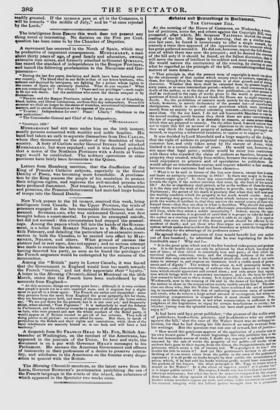New York papers to the 2d instant, received this week,
bring intelligence from Canada. In the Upper Province, the trials of prisoners engaged in the late treasonable disturbances had com- menced. SUTHERLAND, who was nicknamed General, was first brought before a court-martial. In prison he attempted suicide,
but did not succeed : this circumstance had stopped the proceed-
ings. Among the papers which fell into the bands of the Govern- ment, is a letter from ROBERT NELSON to a Mr. RYAN, dated
25th February, and detailing The particulars of an extensive insur-
rection in both the Canadas, to be carried into effect by MAC- KENZIE, NELSON, and others. What ground of success the plotters had to rest upon, does not appear ; and no serious attempt was made to execute the scheme. NELSON accuses PAPINEAU of having deserted his party, as soon as he found the privileges of the French seigneurs would be endangered by the success of the insurrection.
Among the "British" party in Lower Canada, it was feared that the Government in England would lean too much towards the French "traitors,' and not duly appreciate their "loyalty." A letter in the Morning Chronicle, dated at Montreal on the 26th March, states that the French have been emboldened by the accounts from England- 4. At this moment, things are pretty quiet here ; although it is very evident that people's minds are in a very unsettled state, and it requires but a slight eause to put all in a blaze again. The French are sullen and dissatisfied : since they perceive from the news horn England the great aympallgy felt for them, they are becoming more bold, and many of the most violent of the lower orders say, We are put down for the present, but it is not over yet,' and frequently shout, when excited, Vivo Papineau!' It is melancholy to read the debates in Parliament, and the editorial remarks in papers of all shades of politics. To as here, who were present and saw the whole conduct of the Rebel party, it would appear as if Britain wanted to get rid of her colonies. They talk of doing justice to all parties: we never asked for more. But then, to speak of protection to the Rebels and their rights and institutions, while those of the byal inhabitants are scarcely hinted at, is too bade and will have a bad +tendency."
A despatch from Sir FRANCIS HEAD to Mr. Fox, British Am- bassador at Washington, on the conduct of the Americans, has appeared in the journals of the Union. In tone and style, the document is on a par with Governor HEAD'S messages to his Parliament. He accuses the American Government and officers of insincerity in their professions of a desire to preserve neutra- lity, and attributes to the Americans on the frontier every dispo- sition to quarrel with the British.


























 Previous page
Previous page